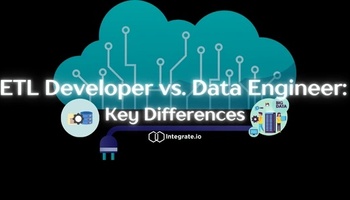Five things to know about this topic:
-
Computer scientist and "father of the data warehouse" Bill Inmon recalls the time when Detroit automobile makers couldn't see the competition coming.
-
He argues that most companies don't care about their customers apart from specific scenarios.
-
The COVID-19 pandemic might force companies to listen to their customers.
-
Learn what happened when one company failed to realize the importance of data warehousing.
-
Integrate.io is a no-code data pipeline platform that listens to its customers and streamlines data integration.
This is a guest post for Integrate.io written by Bill Inmon, an American computer scientist recognized as the "father” of the data warehouse. Inmon wrote the first book and first magazine column about data warehousing, held the first conference about this topic, and was the first person to teach data warehousing classes.
A few months ago, a professor at San Diego State told me that most businesses do not listen to their customers. I had always thought ALL well-run businesses knew who their customers were and listened to them.
I was wrong.
Integrate.io helps customers who want to integrate data from disparate sources to a supported target system. This no-code data pipeline platform simplifies the data integration process for users with ETL, ELT, Reverse ETL, data observability, data warehousing insights, and fast Change Data Capture (CDC). Why not try Integrate.io yourself with a free 14-day trial?
Not Seeing the Competition Coming
Last night, I watched a TV program about the history of the makers of the automobile. It was an interesting show. But one thought got stuck in the back of my mind. How in the world did Detroit miss the fact that Japan and Germany were going to — permanently — take huge amounts of market share away from them? The TV show focused on Lee Iacocca and John DeLorean. Apparently, DeLorean listened to street racers and no one else. Iacocca seemed to have a broader focus on who he listened to. Yet no one saw the Volkswagen and the Honda coming.
Apparently, there were more than street racers out there wanting to buy cars. In fact, street racers were only a small percentage of car buyers. So much for the arrogance and ignorance of DeLorean.
Detroit must have been blind to not see the competition coming. It's kind of like the Texans at the Alamo not seeing Santa Anna's troops surrounding them. You would have to be blind to have missed that. (And deaf, too.)
They pay those executives a lot of money in Detroit to be smart. I guess they threw their money away. Or maybe they just had the wrong people making decisions. Or maybe the people who thought they were smart were not nearly as smart as they pretended to be.
Listening to the Customer
So when do corporations listen to the voice of the customer? There are two times when corporations pay attention: when the corporation is fighting for market share or when a corporation is trying to keep market share. The rest of the time, corporations don’t even know who their customer is. Or care.
In the early days of the cell phone industry, there was a mad scramble for customers. In that day and age, cell phone corporations listened to their customers and prospects. And today, big box retailers listen to their customers because the internet is eating into their business. So these companies do pay attention to who their customers are and what they are saying.
But other than those two instances, there are few examples of organizations that pay any attention to their customers.
The professor in San Diego was right.
Biggest Culprits
So who doesn’t pay attention to their customers? The list has to start with banks and financial institutions. Once you become a customer of a bank, you are locked in for life and the bank immediately forgets your name. The other example is airlines. Airlines don’t know who their customers are or what their customers care about. Now that may have changed since COVID. The airlines experienced such a drop in business because of the pandemic that they may actually start to care about their customer. (It is tragic that it takes a disaster like COVID to get the attention of the airlines. Maybe the airlines hired all the genius executives from Detroit who didn’t see Volkswagen coming!)
The single most inane example of not seeing a market coming takes me back to StorageTek and the early days of the data warehouse. Data warehousing was just beginning to become established. I spoke with the head of strategic planning at StorageTek and described to him what this new thing called the data warehouse was all about. His words were, “I don’t see any relationship between the demand for storage products and the advent of the data warehouse.”
That was the single dumbest thing I have ever heard in my life. And they were paying this man a lot of money to be a clown. A short while later, StorageTek ceased to exist as a company.
The problem is that even well-established corporations with a stable customer base should be constantly caring about their customers. Because constantly listening to your customers helps you KEEP your customer base.
Final Word
Listening to your customer base needs to be a constant and daily activity. In summer. In winter. In the springtime. Every day. All the time. Take a look at what happened to Detroit and the car industry or StorageTek if you don’t believe this.
Bill Inmon, the father of the data warehouse, has authored 65 books, and Computerworld named him one of the ten most influential people in the history of computing. Inmon's Castle Rock, Colorado-based company Forest Rim Technology helps companies hear the voice of their customers. See more at www.forestrimtech.com.
Integrate.io helps our customers achieve their data integration needs. The no-code data pipeline platform simplifies integration for multiple use cases, allowing customers to move data from disparate sources to a supported centralized location for analytics without the hassle. Schedule a demo now.










